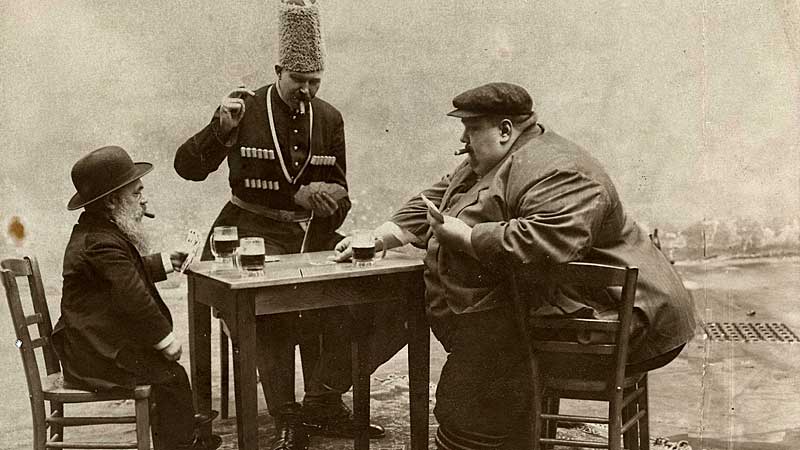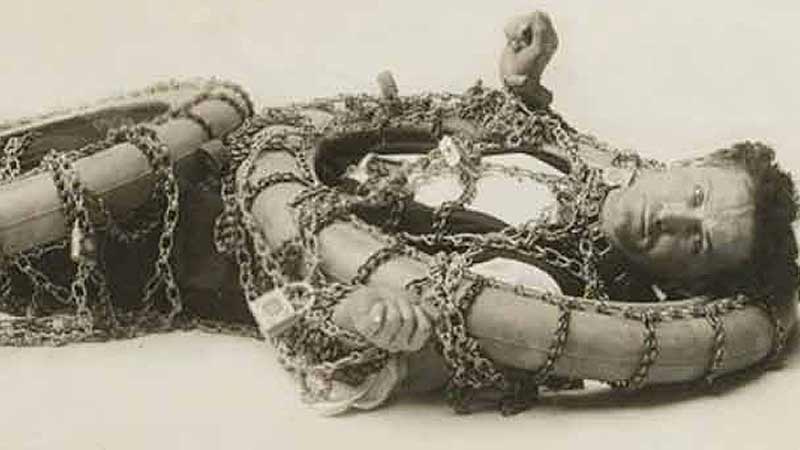Trent James' "Go For It While You're Young" Podcast Interview
by Christian Painter and Roland Sarlot

What We'll Explore
Trent details his path and suggestions of starting not with tricks but with an act, performing anywhere, any time, for any pay, finding a mentor, working with agents, the business side of entertainment, and being ready.
Who is Trent James?
Trent James works cruise ships, corporate, colleges, the Magic Castle, been a featured act at the Chicago Magic Lounge many times, recipient of the Milbourne Christopher Award but what makes this even more remarkable is that Trent is only 24 years old.
Running Time:
The following interview has been edited and condensed for clarity.
What you can do
You are welcome to share up to 500 words of the below transcript in a non-commercial purpose provided you credit and link back to our site like this: "The Magic Oracle Business Podcast".
The Interview
Christian Painter: On this episode of the Magic Business Podcast...
Trent James: You can spend so much time and money trying to get into a market or industry and it's just not happening and it seems like the phone calls always come very last-minute for big opportunities.
Christian Painter: Welcome to the Magic Business Podcast, where we share insightful and delightful inner secrets about the business of magic. This is where magic professionals present their real-life experiences and some of their most guarded secrets, to help further your career in the magical arts. I'm your host, Christian Painter, in partnership with the MagicOracle.Club, where you can hear all of our magic business podcasts.
Trent James is based in Chicago, Illinois. He is a full-time professional magician. He has worked cruise ships, corporate, colleges, the Magic Castle, been a featured act at the Chicago Magic Lounge many times but what makes this remarkable is that he is only 24 years old. Of course, it might be notable that he did win the Milbourne Christopher Award for the most promising young magician. We wanted to have him on the show because we believe he is one of the hardest-working magicians that you've never heard of. Welcome to the show, Trent.
Trent James: Thanks for having me, Christian.
Christian Painter: One of the reasons Roland and I were really excited to have you on the show is because it's easy for the older guys to talk about how we became professionals. But that was 20, 30, 40 years ago for some of us but you've done it in the last five years.
Trent James: Yeah. Yeah.
Christian Painter: And so, the key is, is we just want your secrets, Trent! There's gonna be a lot of young guys, listening. There's gonna be the guys who are maybe 14-years old who listen to you, and even guys who are going to be 30-years old listening to you right now wondering, "How do I get started? How did you get there?"
Trent James: Everyone's path is different. But for me, I got started in magic at age five. My dad got me into magic. I feel like it really didn't take off until when I was 14. I developed the contest act and that was sort of the beginning. From there, that act taught me how to be in a show, how to create an act, keep working on an act, making an act better. That was the start of it, from there, it just sort of took off.
Christian Painter: So then you're telling me step one is maybe do competitions.
Trent James: Not for everybody. And I feel like even now, I mean that was ten years ago at this point, and you're seeing less contests out there. I think just step one would be develop an act. You know, that could be a silent act. That could be a talking act. It could be 10-minutes long. It could be five-minutes long. It could be 20-minutes long. Develop an act, a structured piece, something that you can build on, you can work on, you can develop, and grow with.
Christian Painter: Where am I going to practice this act? How am I going to get this in front of people?
Christian Painter: Right. That's probably the most challenging part when you're 14, because corporate clients aren't calling you for a show. So, for me, the natural outlet was these magic contests. So, I developed this act, and I did a contest. I was lucky enough to win, and then entered another contest, and worked on the act in between that, and do another one and do another one, and do another one. And then eventually, all these conventions that I had been in the contest act had brought me back to be in some of the gala shows as a performer, which was super cool. I think the contests are a great outlet. Just go into it. Don't worry about winning. That was never part of it for me. Certainly, it's fun to win. But the deadline of having that, "Well, it's coming up in April, makes you really gotta get this going, really gotta get working on this," is important.
So, those contests and, a lot of people say open mics but for someone who's young, I think can be very intimidating, and maybe not the best performance outlet but it's good to do any show, to do anything. And sometimes, if you're bringing a manip act to an open mic, you're probably not going to get a ton out of it. It'd probably just be extremely stressful. But yeah, find anything you can. For me, when I was a kid, it was contests, like old people's homes, and Boy Scouts, anything.
Christian Painter: So just get out there and perform anywhere, anyhow. Don't worry about getting paid, just do it.
Trent James: Yeah, just do it. And I think that's a pretty typical advice. But I think having that act for a blue and gold banquet coming up... Develop an act. Don't just do some tricks. Develop a piece.
Christian Painter: Oh, okay. So what you said there is pretty heavy because I think a lot of people do, they just do a parade of tricks. They're not really thinking about an act.
Trent James: Right. Right. And that's one of the reasons I love manipulation magic is because you have an act. It's something that flows. You have a series of tricks. Sometimes it's 10 tricks. Sometimes it's 60 tricks. But I think creating that flow, into an act is something special. And an audience feels that. They know when it's just tricks. They know when you're, "Okay, did that, put that away and take out the next thing," and keep going. And certainly, everyone starts that way. That's how I started, for sure. But I think building that core piece, whatever it could be, and then just constantly build and bettering it, maybe that's cutting something out, maybe that's, changing it entirely, if it's not working.
Christian Painter: Okay, we got our act. What's next?
Trent James: You have the act. That's the most important thing, and you will work on that forever and always and it will never be perfect. If you're developing this act at a young age, at some point, you will probably kill the act. You'll probably stop doing that material. Maybe you outgrow it, and that's what it was in my case. I was doing a silent manip act, and I just outgrew it. I changed a lot as a person from 14 to 18, let alone, my magic developed. So, I was known for doing this manip act, and I stopped doing it, which was a big step and change everything. But building and developing is a process that never ends.
So, once you have that, I think finding a mentor you can trust is important. And I say that… we all have magician friends, and it's hard to get honest feedback from some friends. So I think finding someone you can trust who will be honest with you, "Is this good? Do I need to cut this? Don't do that again. That was terrible," whatever, I think is important. For me, I needed help on the business side of things, so I found someone who was in the entertainment industry, not in the magic industry directly but in the entertainment industry, who could guide me through that process, who could recommend, "Hey, go do this NACA conference to try to get in the college market," something I never even heard of at that moment. But finding a mentor, whether that be for magic or for the business side of things, I think is very important. There's nowhere that teaches this stuff. Never once did I learn how to be a magician in school, unfortunately. I learned how to do many other things, but never how to be a magician. And as you know, the tricks are such a small part of being an entertainer.
Christian Painter: But part of that mentor part is also being able to… when the guy says, "This is wrong. This sucks. You gotta redo this, or you're gonna have to rework that," is to be able to take that, right?
Trent James: Right. You have to take it. You can't let it upset you. You have to also decide if that person's right or not, because, I mean, we've had many conversations about things, and some things I listen to, some things I don't, not that you or someone else is wrong, but just because I feel deep down this is what I believe. And who knows, maybe a year from now, I could go back and be like, "Man, Christian was right. I should have stopped doing that." But finding that person you can trust and trusting that person, but also trusting your gut. So, if you feel like it should be a different way, don't let that person decide everything for you, certainly not, because I see that a lot, where someone will recommend something and immediately they'll change it. Immediately. Without thinking about it.
And I think it's good to ask questions, too. If someone says, "Why are you doing this?", and why ever they might not like it, ask them, "Why don't you like it? What don't you like about it? Is it because of this? Was my delivery off? Was it, you know, what I was wearing? Was it when I said it?" There's so many things, you know. I always want to know. I always want to get feedback. I also want to know why a person feels that way. And I also think there's a moment for feedback, too. Like, I'm not a person right after show who wants to get, feedback immediately. If I had a good show, I'd rather just live in that for a moment before you go, "Oh, you know what, we gotta do this, don't do that," or, "We have to change that or this." I think it's good to let things breathe for a moment before you start working on it.
Christian Painter: Exactly. Yes. The first thing we should do is not run up and tell someone, "Oh, you flashed that one thing." "Well, I just got a standing ovation." "Yeah, but you flashed." Right. No, we understand that. So, okay, I like where this is going. You've built an act. You've built it through the magic world and competitions. You've found a mentor. The mentor helped you find... Here's my, "some footsteps into getting into" like you said, the college market. But I want to pull back just for a moment because, gosh, you've also done the Magic Castle, you're doing the Chicago Magic Lounge. How are you getting your name out there? How are people seeing this young guy?
Trent James: Like any business, any industry, it's all about connections and who you know, and also being good, obviously. I think that's very important. But I feel like everything that I've booked is because I think my show is a good product. I think I've worked hard enough that it's a solid product. And it feels like everything that I book is because of, maybe not word of mouth is not the proper way to describe it, but in a way, yeah. People see you do this and see you do this, and your friend recommends you for this and that, and that's what it was with the college market. I took a step to...and that's the next step, I think, is taking a big step, taking a risk. My friend recommended that I look into the college market. He thought I'd be great for it.
Christian Painter: Now, did you go to trade shows there and set up a booth? What did you do?
Trent James: Yeah. You can be self-rep'd. You can have an agency for the college market. I think the way to go is to have an agency. When I was getting in the market, I didn't have an agent. No one knew who I was. There's a lot of entertainers. There's a lot of magicians in the market. A lot of agencies already have their person. So it's hard to get in. So I figured, "You know what, let me go try this, be self-rep'd. Let me go do some magic in my booth. I didn't get a showcase. There was really no chance that I would get a showcase, being my first NACA. This is what I'm speaking about. So I thought, "You know what? Let me give this a try." And I thought, "If I book one or two things, it's all worth it and I'll break even," because it's quite the investment. And then it was a big step. It was a big risk.
Christian Painter: And for the listeners, let's explain. When you go to a NACA or an APCA, it's not cheap.
Trent James: No. No.
Christian Painter: I mean, you spent probably a couple grand, right?
Trent James: Oh, yeah, definitely. Like, luckily, I was driving distance, so that saved the airfare. I think I would have been 19 for this first NACA that I did. So, I mean, I probably invested $2,500, something like that. Of course, I submitted for a showcase, not knowing that at that time I wouldn't get it, and all those things. So it's a big investment. And get ready, I booked zero shows out of that first NACA, zero shows. However, I met an agent. There was an agent across from me. They saw what I was doing. They saw how I was interacting with students. They saw that I was a fresh face. I'm 19 years old. I think I definitely look my age, if not younger. But they saw what I was doing and they kept in the back of their head. They already had a magician. They didn't need another one. But it was, they had a show they needed filled. It was a nooner, which, Christian, you know what a nooner is and how hard they are.
Christian Painter: They're very difficult. Yes.
Trent James: It's an event that usually happens in the early afternoon, if not noon, on a college campus. In this case, it was a community college. It was in the cafeteria at noon. So, everyone was eating their lunch, really no interest in watching a magician. But that was the first college performance I ever did. And they called me for that one gig. They needed it. It was a last minute thing. I think it was a week out. They called me, and I said yes, and I did it. And then a month later, I was on their roster. And it's pretty cool to go from just trying to navigate through this thing to be on with a pretty reputable agency, and, yeah.
Christian Painter: You've worked cruise ships as well. I mean, that's quite a feat as well, as young as you are, to get yourself our there. So now, are you just submitting to other agents? And I don't mean this just for cruise ships, but with colleges and all the other stuff you're doing, I mean, you seem to be...as someone who is not well-known... I mean, there's people who know you, obviously, in the magic world, but I mean, overall, you don't concentrate on the magic world at all. I see you always working in the real world. How are you doing that? Are you just out there sending stuff to people, sending videos, whatever? What are you doing?
Trent James: Never, which is the odd part. So, I mean, I started very much in the magic world. And then, after I kind of killed the competition, I developed this new show, this new style, and I sort of backed away from the magic community, not for any particular reason, just to kind of focus, to... You know, because sometimes, when you focus on what everyone else is doing, you're not accomplishing anything yourself. So I think it's good to set a goal and focus and get to that. And I had certain goals. One of them was getting with a college agent, and then another was getting with a cruise agent. And the cruise agent was a friend who recommended me to his cruise agent. They reached out looking for more acts, young acts, fresh acts. And he recommended me, and it was probably around the same time...I was probably 18 or 19, and I submitted a video and heard nothing, went nowhere. Oh, well. I thought the video was good. Maybe, whatever, for whatever reason, they didn't go with it.
And then a year later, they emailed again, saying, "You looking for recommendations?" And he said, "Can I suggest you again?" I said absolutely. I had a new video I think that showcased me better. And also, I had a year of development to be a better entertainer. And then they signed me for that. And, I always wanted to do cruises, but it wasn't, like, my main focus at that time. My main focus was the college market, and I think still is. But being ready for those opportunities, I think, when I got that email, I was ready to go do a cruise ship tomorrow if they needed me to. And it seems like, from my experience in the entertainment industry, the phone calls always come very last-minute for big opportunities.
Christian Painter: Well, I think for a lot of people that is how it works. You keep throwing stuff against a wall, and sooner or later something comes back that surprises you.
Trent James: It can be, you can spend so much time and money, wait, trying to get into a market or industry and it's just not happening, but then, once again, like with this college, "We need you to do the show next week." If I would have said no, they would never have called me again probably, you know? That would have been dead. So, I mean, be ready for those opportunities, be ready for those calls.
Christian Painter: But I would also say, Trent, and I know you probably wouldn't say this about yourself, but we have worked together a few times in various ways. And one of the things that I've seen about you is where a lot of magicians will sit and, like, they can't get out of magic, or just keep talking about tricks or talking about magic, and I'll watch you talk more about business. So, when you're in that mode, you're not that, "Oh, I just only want to talk about magic." I see you looking at the business side. Talk about that for a moment.
Trent James: Yeah, I mean, obviously, the business side is so important. And the business side is certainly my least favorite part about being an entertainer, but easily, probably the most important. Having that show is so important. And I spend so much time on that. I spend so much time working on the show. And I think you need to have that good product. But focusing on, you know, having good promo, having good photos, you know, is so important. And every year, you know, constantly, I've gotta do a new video. And for me, you know, being young, I would look different every year. I'd look older. I'd change whatever, my hair, whatever. And so it would be very important to constantly be updating promo. But I was never a person submitting things, because one thing I always feared was, I think, with all these industries, people talk. So if I were to, you know, let's say when I was 14, submit a video to a cruise agent, I was not good, certainly not ready for anything near that level.
So they'll see it, maybe they're like, "Trent James, who is this? Oh, man, this is bad." And then my name is a sour taste in their mouth. Could be forever, and I think that goes the same way with doing a bad show or anything. You want to be careful with any of that. But yeah, you want to make sure you're ready for the opportunity, but also be honest with yourself if you're not.
Christian Painter: Okay. Let's look at what you've told us. You said get out there, develop your act, however you gotta do that. Work in whatever way you can. Don't worry about getting paid. Just get in front of audiences, develop an act, and not a bunch of tricks, but an act. That was step one I heard. Step two, find a mentor, and that's not one of your buddies, not one of your friends. But you're saying find someone who's already ahead of you, that's already doing it, who will take you under their wing and teach you the business or the act. Right?
Trent James: Right. And even better if they're not directly in the magic industry, because it can be kind of tough. If you're trying to get in the college market, and you go talk to a college performer, some people can be kind of, you know, they're not interested in...
Christian Painter: Helping you.
Trent James: ...sharing information on their market.
Christian Painter: That's right. Of course.
Trent James: They don't want more competition, which I certainly understand. But I also think, if there's a reason someone books another performer over me, it's because they like that other performer. You can't rip yourself up over it.
Christian Painter: Step three. Let's go to step three. Step three was you gotta take the chances, right, now that you understand the business. So you spent a lot of money, you went to the NACA showcases and that, and you took a chance. And even though you got nothing, you did catch the eye of someone. So it's that you just gotta keep throwing stuff out there, understanding it's gonna cost money, right?
Trent James: It could pay off immediately, but eventually did and it's...
Christian Painter: Right. And I think another thing you kind of...you didn't say it out loud, but you've definitely hinted around it, is you've got to be shaking hands and kisses babies, you've got to be meeting people that are going to take you to the next level, or opening doors for you. You can't just sit in your own little group.
Trent James: Yeah, I mean that's what I think though what the contest act did for me. While I don't do almost any event magic that I did in that manipulation contest act, it did certainly introduce me to so many people that have been now critical in my career to get to that next level. I know Ben Barnes, the booker at the Chicago Magic Lounge, because of that manip act. It's not what I'm doing anymore, but that's why I know him and I'm friends with Ben.
Christian Painter: I'm sure you've had some younger people ask you, "How do I just become a professional even?" What's the question they never ask you, but they should be asking you?
Trent James: "Am I ready?" It's a question a lot of us fear I think, because you don't want to hear if you're not. That could be painful. It can certainly be upsetting. But I think I would much rather know that I'm not ready rather than go invest money and time just to learn the hard way, and potentially spoiling your reputation or something. So I think "Am I ready?" is a good question to ask. And asking it to the right person, once again, you know, if you ask, you know, your best friend, they're gonna, "Oh, yeah, you're totally ready. You're gonna kill it. You're gonna make so much money." But finding someone who can be honest with you, and you've certainly been honest with me, but I think that's super important. And not a lot of people ask that.
Christian Painter: Well, and I think a lot of people are not prepared to hear the honest truth. And that becomes another issue. Wow. Okay. So, I think this has been really interesting because you've just laid it out. And Trent, thanks so much for being on the show. It's been great.
Trent James: Thanks for having me, Christian.
Christian Painter: Thank you for listening to our Magic Business Podcast. Please visit the MagicOracle.Club, where you can hear all of our Magic Business Podcasts and enjoy a bunch more magical knowledge and information that you didn't even know was out there.
Here's a really fun quote, it gets right to the point, by Harry Blackstone Sr.: "The personality must be bigger than the prop."
As always, we at the Magic Oracle wish you continued success on your path in the magical arts.
A Jolly Genie?

The Magic Oracle is a FREE site but I still must pay dastardly server fees! Please, donate ANY amount... $1, $5, $10, why not $1 million?
THANK YOU for keeping magic alive... and me, a Jolly Genie!



